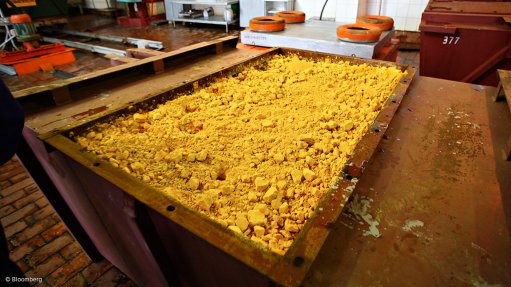
Photo by: Bloomberg
TORONTO (miningweekly.com) – The Grand Council of the Crees on Monday called upon the newly elected Quebec premier Philippe Couillard and his Quebec Liberal government to ensure that English versions were prepared for all documents relating to the public hearings of the Bureau d'audiences publiques sur l'environnement (BAPE) regarding the province’s uranium sector.
The First Nation is host to a significant proportion of uranium deposits and of uranium exploration projects in Quebec, which are located in the Eeyou Istchee territory, and its opposition to uranium exploration and mining have had a significant impact on the industry in the province over recent months.
"The Cree Nation and I have awaited with strong interest the release of the public consultation document concerning the mandate recently entrusted to the BAPE concerning the impacts of uranium exploration and mining in Quebec.
“We were troubled to learn that the complete document was made available on Wednesday only in French, when it is well known that a large proportion of the Cree population does not speak that language. The English summary document that has been made available is brief and incomplete,” Grand Chief Matthew Coon Come said, adding that the situation did not facilitate the First Nation’s full participation in the important process and did not respect the Crees' treaty rights.
Coon Come said that the Cree are “most directly affected by uranium-related activities in Québec".
The First Nation is embroiled in a long-standing legal wrangle with uranium explorer Strateco Resources, which wants to press ahead with underground exploration at its flagship Matoush project, located within the Eeyou Istchee reserve.
Located near the Cree community of Mistissini on Cree family hunting lands, the Matoush project is the most advanced uranium project to date in the Cree territory of Eeyou Istchee and in Quebec, but the First Nation had declared a moratorium on any uranium development on its reserve lands, prompting the provincial government to also implement a moratorium on uranium project permits pending the outcome of the BAPE public consultations.
The BAPE's mandate to conduct an inquiry and public consultation concerning the uranium sector was granted in March by the Sustainable Development, Environment, Wildlife and Parks Minister.
“… a nation-to-nation agreement was concluded between the Crees and the Quebec government prior to the announcement of the BAPE mandate. This agreement confirmed the commitment of the Quebec government and the Environment Minister to ensure that the BAPE mandate concerning the uranium industry in Quebec will not infringe the treaty rights of the Crees under the James Bay and Northern Québec Agreement.
“The release of this consultation document in its complete form, exclusively in French, does not adhere to the spirit or the letter of this commitment,” Coon Come stressed.
He pointed out that the James Bay and Northern Quebec Agreement affirmed that the Cree people were entitled to a ‘special status’ and involvement beyond that provided for in procedures involving the general public through consultation or representation mechanisms, whenever it is necessary to protect or give effect to Cree treaty rights.
Strateco is currently arguing its case in front of the Superior Court of Quebec to nullify the Quebec Environment Minister’s decision to refuse to grant a certificate of authorisation for exploration.
The certificate of authorisation sought by Strateco is the only approval still required to begin the advanced exploration phase of the Matoush project. All the other permits had already been obtained from the other agencies involved in the process, and the Quebec government itself had delivered more than 20 certificates and authorisations of various types allowing the project to be realised.
Quebec-based Strateco has vowed to continue to vigorously defend the interests of its shareholders, who had invested more than $123-million in the project.
Strateco last month noted that after undergoing a similar exercise involving a review of scientific studies, Greenland (Denmark), Queensland (Australia) and Labrador (Canada) had lifted their moratoriums on uranium exploration and mining.